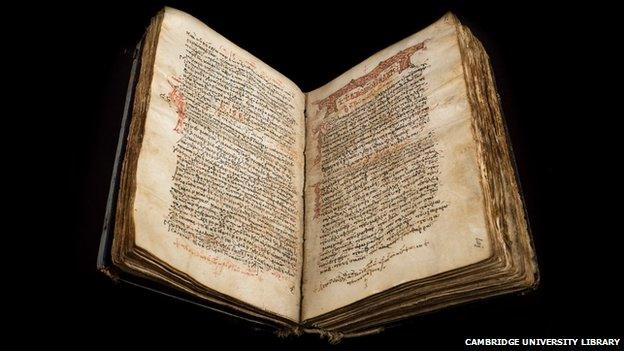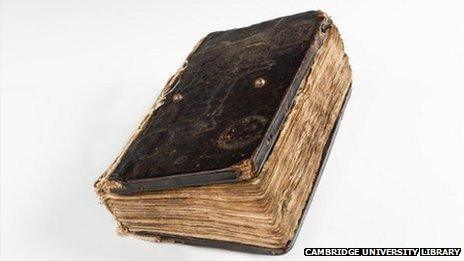Cambridge University 'hope' for biblical manuscript bid
- Published

The 176 leaves of the Codex Zacynthius are made of vellum - a treated animal hide
Cambridge University has said an appeal to raise £1.1m to buy an early Biblical manuscript it has held for 30 years is "progressing well".
The Codex Zacynthius, which dates back to the 6th or 7th Century, has been in the university's library since 1984.
Now its owner - the Bible Society, in Swindon - is offering the manuscript for sale in order to raise money.
Anne Jarvis, university librarian, said they were hopeful of raising the money before a 28 February deadline.
'Unique'
The Bible Society was presented the 176-page Codex Zacynthius in 1821 and has offered the university library first refusal to buy it.
However, if the target is not reached by the end of February it could be auctioned to the highest bidder.
Dr Ben Outhwaite, from the university, said the manuscript was "unique" and "must be in the top 20 of New Testament manuscripts".
"It's our duty as a public institution to make sure that items of world heritage like this remain in public institutions," he said.
The university said Codex Zacynthius was a palimpsest - "a manuscript from which text has been scraped or washed off in order for it to be used again".
The pages are made of treated animal hide and it is believed they were first used in the 6th or 7th Century when inscribed in Greek with a portion of the gospel of Luke.

Selling the Codex will aid the Bible Society in its fundraising for a new £1m visitor centre, external inside a deconsecrated church in North Wales.
Paul Wooley said the society was offering the early manuscript for sale because it had an "ethical and legal responsibility" to review its assets.
"We've taken the decision that we should offer this manuscript to Cambridge University library in order that we can use the funds to promote our broader charitable objects," he said.
"We're very confident they will be able to secure the funds. We don't expect it to be a problem. If it is we'll have to cross that bridge when we come to it.
"We certainly want to see this manuscript remain available to the public."
- Published11 December 2013
- Published19 December 2012
- Published16 November 2011
- Published25 December 2011